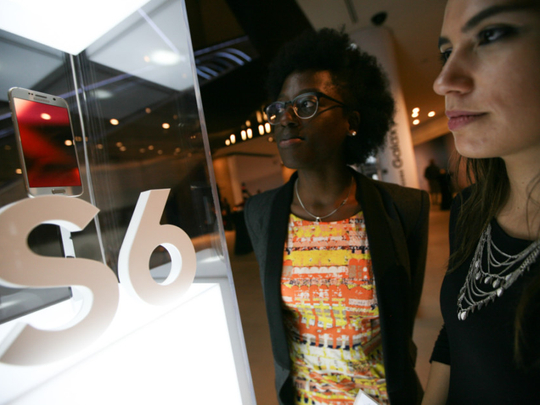
Dubai: Samsung’s flagship smartphone Galaxy S6, which will be available in the UAE on April 10, is very unlikely to be a game changer for the Korean company in the high-end category, an industry expert told Gulf News.
Daniel Gleeson, senior mobile devices and networks analyst at IHS, sees Samsung losing market share this year, dropping from 308 million smartphone shipments in 2014 to 261 million in 2015, mainly due to competition in the low end of the market rather than in the high end.
The Galaxy S6 Edge is definitely a beautiful device, he told Gulf News, but that leaves the normal S6 in an odd position in the market. It also puts “immense pressure” on Samsung’s display unit to produce enough of the curved screens to meet demand.
“Difficulties in producing curved screens already led to restricted stocks of the Note Edge, which was launched last year. If Samsung over hypes the curved screen in its marketing, but then cannot deliver, Samsung’s brand will suffer greatly,” he said.
Gleeson said the key issue for Samsung is that while it excels at technology and engineering, it is weak in software compared to Apple and Microsoft. Enterprise sales are much more concerned with “security and services” than having the best display possible.
Samsung is already very active in the enterprise sector having launched its KNOX security platform in 2013. The partnerships with Microsoft and Samsung go to address the two central weaknesses of Android in the enterprise space – security and Microsoft Office.
Globally, IHS forecasts that 1,479 million smartphone will be shipped this year compared to 1,273 million in 2014.
“With Apple dominating the premium phone market and the Chinese vendors increasingly offering quality hardware at lower prices, it is through a solid ecosystem of apps, content and services unique to Samsung devices that Samsung can secure more loyalty and longer-term differentiation at the high end of the market,” Roberta Cozza, research director at Gartner, said in an emailed statement.
Chinese vendors, such as Huawei and Xiaomi, are continuing to improve their sales in China and other overseas markets, increasing their share in the mid to low-end smartphone market. “Chinese vendors are no longer followers,” Cozza said.
“They are producing higher quality devices with appealing new hardware features that can rival the more established players in the mobile phone market. Brand building and marketing will be key activities in deciding which Chinese vendors can secure a foothold in mature markets,” she said.
Another important thing to note about the Galaxy S6 is that Samsung is using its home-grown processor, the Exynos 7420. In the past, it has relied on Qualcomm chipsets for its flagships.
Hayssam Yassine, head of telecommunications group at Samsung Gulf, said that Samsung has invested a lot on chip development and “why not use our own chip when it can give better performance than other chips. Our intention is to meet the objective and efficiency.”
Gleeson said the move could help Samsung recover more profit from each Galaxy S6 than it otherwise would. This is likely a driving reason behind the shift as Samsung’s mobile operating profit margin declined to under 10 per cent for the first time in nearly five years in the fourth quarter of 2014.
In 2012, this unit reported margins of over 20 per cent each quarter, Gleeson said.
Samsung is pinning its hopes on its Samsung Pay, a contact-less payment system, following the success of Apple Pay. Samsung Pay is available only in the US and South Korea.
Gleeson said that the mobile payment services offered by Samsung and Apple are customer retention services rather than ones that will actively entice customers to use their handsets.
“The success or failure of both will really be determined by the level of support banks, card companies and retailers in each market. Apple Pay in the US is a guaranteed hit due to the high installed base of Apple devices there coupled with the high attach rate of credit cards and the lack of chip and PIN technology in those credit cards,” he said.
He said the success of Apple Pay or Samsung Pay in markets with fewer payment cards and where the handset market is fragmented.
“We are in touch with our headquarters to know why the region is not considered for Samsung Pay as this region is very advanced,” Yassine said.












